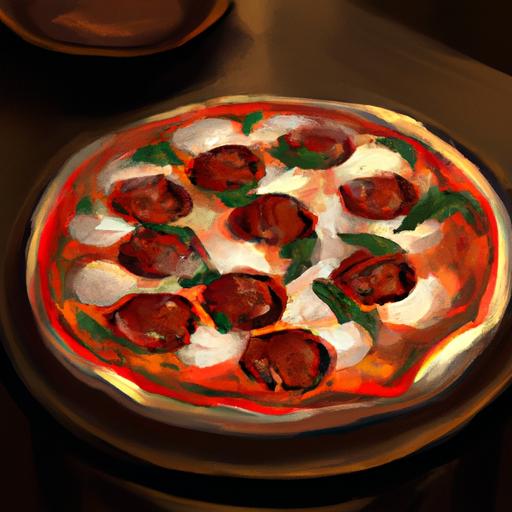Are you looking for the perfect way to make a delicious pizza at home? Pizza stones are an essential tool for cooking the perfect pizza.
But what are pizza stones made of? In this comprehensive guide, you’ll learn about the different types of pizza stones, the benefits of using a pizza stone, and how to use and care for one.
From clay pizza stones to metal pizza stones, you’ll learn how to use each type to make a perfect pizza every time.
So, let’s dive into the world of pizza stones and learn exactly what they are made of and how to use them!
Table of Contents
Short Answer
Pizza stones are typically made from either ceramic, cordierite, or soapstone.
Ceramic stones are the most common type, and they are usually made of a clay material that absorbs moisture from the pizza dough as it cooks.
Cordierite stones are denser and more durable than ceramic, and they can withstand higher temperatures.
Soapstone is the least common type of pizza stone, and it is made of metamorphic rock that can absorb and hold heat.
Types of Pizza Stones
Pizza stones are an essential tool for any home chef looking to make a perfect homemade pizza.
They come in a variety of materials, each with its own unique benefits and drawbacks.
The three most common types of pizza stones are clay, cordierite, and metal.
Clay pizza stones are the most traditional and authentic way to make a pizza.
They provide good heat conduction and are the best for evenly distributing heat and absorbing moisture from the dough, which helps to create the perfect crust.
Unfortunately, clay stones are also the most fragile and can easily crack or break if subjected to sudden temperature changes or mishandling.
Cordierite pizza stones are a more durable option and are designed to withstand higher temperatures than clay stones.
This makes them a great choice for those who want to make pizzas with a nice, crisp crust.
However, cordierite stones do not conduct heat as efficiently as clay stones, which means they may require a longer preheating time.
Finally, metal pizza stones are the most affordable option and the most versatile.
They can be used in a variety of ways in the kitchen and are great for baking breads, roasting vegetables, and more.
Metal pizza stones are not as effective as the other two materials when it comes to creating the perfect pizza crust, but they are still a reliable option.
Benefits of Using a Pizza Stone

A pizza stone is a great way to get restaurant-quality pizza at home.
Not only do they create a delicious and crispy crust, but they also have many other benefits as well.
For starters, pizza stones help to evenly distribute heat and absorb moisture from the dough, creating the perfect crust.
This means that each pizza will have a perfect, crispy crust that is just as good as the ones you get at a pizza parlor.
Additionally, the stone helps to keep the pizza from sticking to the pan, resulting in a hassle-free cooking experience.
Another benefit of using a pizza stone is that it can help to retain the flavor and texture of the pizza.
The pizza stone helps to keep the heat consistent, which helps to lock in the flavor of the ingredients and keep the texture of the crust intact.
Furthermore, pizza stones can also help to preserve the flavor of the pizza toppings by preventing them from burning or overcooking.
Finally, pizza stones are a great way to make healthier pizzas.
Since they absorb the moisture from the dough, they help to create a lighter crust that is lower in fat and calories.
Additionally, they help to keep the pizza from sticking, which means you dont need to use extra oil or fat to help it cook.
This makes for a healthier pizza that still tastes great.
Overall, pizza stones are an excellent way to make delicious pizzas at home.
They help to evenly distribute heat and absorb moisture from the dough, creating the perfect crust.
Additionally, they help to retain the flavor and texture of the pizza and make for healthier pizzas that are lower in fat and calories.
With all of these benefits, a pizza stone is a must-have for any pizza lover.
Clay Pizza Stones
Clay pizza stones are the most traditional and authentic way to make a pizza crust.
Clay is a great material for pizza stones because it is a good conductor of heat, which helps to evenly cook the dough and create a crisp, delicious crust.
Clay also absorbs moisture from the dough, which helps to keep the bottom of the crust from becoming soggy.
Clay is a porous material, so it also helps to keep the pizza from sticking to the stone.
While clay pizza stones are great for creating a traditional pizza, they are also more fragile than other types of stones.
They are prone to cracking if they are exposed to sudden temperature changes, so it is important to preheat the stone before use and not to put it in a dishwasher or submerge it in water.
Clay pizza stones should also be seasoned to prevent the dough from sticking to the stone.
To do this, simply coat the stone with oil before the first use, and then re-apply oil between uses.
With proper care, clay pizza stones can last for a long time and provide a great way to make delicious homemade pizza.
Cordierite Pizza Stones

Cordierite pizza stones are one of the most popular materials used for making homemade pizzas.
This type of material is a ceramic mineral that is able to withstand extremely high temperatures and is known for its durability.
Unlike clay stones, cordierite stones are not porous and will not absorb moisture from the dough, resulting in a crispier crust.
Cordierite pizza stones are also able to heat up quickly and maintain a constant temperature throughout the baking process.
As a result, the pizza will cook evenly and the pizzas crust will be perfectly crisp.
Additionally, cordierite pizza stones are relatively lightweight and can be used in a variety of ways in the kitchen.
These stones are also very easy to clean and maintain, making them a great option for those looking to make their own pizza at home.
Metal Pizza Stones
Metal pizza stones are the least expensive option of the three types, and theyre often the best choice for those on a budget.
Metal stones are made from aluminum or steel, and theyre ideal for creating a crisp, evenly cooked crust.
Metal stones heat up quickly and hold their heat well, resulting in a delicious pizza with a perfect, crisp crust.
Theyre also easy to clean and dont need to be seasoned like clay or cordierite stones.
The downside to metal stones is that they dont absorb moisture from the dough like clay and cordierite stones.
This means that the crust may be slightly less crispy, as the moisture from the pizza dough will stay on the stone and create steam.
Additionally, metal stones may not be able to reach the same high temperatures as clay and cordierite stones.
Overall, metal pizza stones are a great choice for those on a budget and who dont mind sacrificing a bit of crispiness in their crust.
Theyre easy to use, easy to clean, and can even be used for other purposes, such as grilling and baking.
For those who want a traditional pizza experience, however, clay or cordierite stones are the way to go.
How to Use a Pizza Stone

When it comes to making a homemade pizza, using a pizza stone is the way to go.
Pizza stones help to evenly distribute heat and absorb moisture from the dough, resulting in that perfectly crisp crust that we all love.
But how exactly do you use a pizza stone?
First, you need to preheat your oven to its highest temperature.
This will ensure that your pizza stone is hot enough to cook your pizza quickly and evenly.
Once the oven is preheated, place your pizza stone on the lowest rack and let it heat for at least 30 minutes.
Once your pizza stone is hot, its time to prep your pizza.
When preparing the pizza, its important to use a light dusting of cornmeal or flour to ensure that the pizza does not stick to the stone.
After your pizza is prepped, carefully transfer it onto the preheated stone.
If youre worried about it sticking, use a pizza peel or a sheet of parchment paper to help you transfer the pizza.
Once your pizza is on the stone, bake it at the ovens highest temperature for about 10-15 minutes.
The pizza should be golden brown and the crust should be crisp.
Once your pizza is done, use a pizza peel or a sheet of parchment paper to carefully transfer it to a cutting board.
And thats it! Using a pizza stone is a great way to get that perfect pizza crust.
Just remember to preheat the oven and stone before you start and to use a light dusting of cornmeal or flour to help prevent the pizza from sticking.
Follow these steps and youll have a delicious pizza in no time!
Cleaning and Caring for a Pizza Stone
When it comes to cleaning and caring for a pizza stone, it is important to be mindful of the material it is made from.
Clay pizza stones should never be placed in the dishwasher, as the water and soap will cause the clay to break down.
Instead, they should be cleaned with warm soapy water and a sponge or brush, then dried thoroughly.
Cordierite and metal stones, on the other hand, can be placed in the dishwasher as long as the water temperature is not too hot.
It is also important to season your pizza stone before and after each use.
This helps to create a non-stick surface and prevents your pizza from sticking to the stone.
To season, simply brush the stone with a light coating of olive oil before baking.
Once the pizza is done baking, remove it from the stone and let the stone cool.
Once cool, use a brush to scrape any remaining bits of dough off the stone, then brush it down with a light coating of olive oil again.
Finally, you should never use any sharp objects or abrasive cleaners on your pizza stone.
These can cause scratches or damage to the stone and can potentially ruin the flavor of your pizza.
Instead, use soft sponges and soapy water to clean your stone, and a brush to season it.
With proper care, your pizza stone will last for many years and help you make delicious pizzas every time.
Final Thoughts
In conclusion, pizza stones come in a variety of materials and offer plenty of benefits.
Clay pizza stones are the most traditional and authentic way to make a pizza, while cordierite stones are more durable and last longer.
Metal stones are the most affordable option and can be used for a variety of kitchen tasks.
All pizza stones help to create the perfect crust by evenly distributing heat and absorbing moisture from the dough.
Now that you have a better understanding of what pizza stones are made of, why not use the knowledge to make your own homemade pizza tonight?

